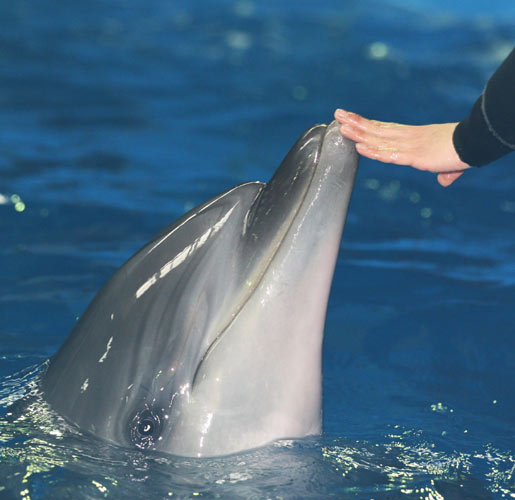Dolphin-assisted therapy helps children with mental disabilities
Updated: 2012-12-16 09:23
By Shi Yingying and Erik Nilsson (China Daily)
|
||||||||
Dolphin-assisted therapy for children with mental disabilities has made a splash in the West, and China is now riding the experimental tide. Shi Yingying and Erik Nilsson examine the impact these marine mammals have on the children they come into contact with.
Zheng Jun says 15 sessions with a pair of bottle-nosed dolphins at Hangzhou Polar Ocean Park have helped his 5-year-old autistic son become "aware" and "alert" enough to become his kindergarten's class monitor. The father believes the dolphin-assisted therapy has been more effective than any other treatment. "Now, you can't tell he's different from his classmates," he says. Zheng became a believer after he visited an Australian dolphin-swim program years ago. He says his son is elated when he splashes with the creatures in the park in Zhejiang province's capital.
 |
|
Dolphins help children open up just by simply playing with them. [Photo by Li Bo /For China Daily] |
More than 80 parents of children with severe mental disabilities have booked all of next year's spots in the program. (Sessions only run in the summer because the water temperatures are too cold for the kids in other seasons.)
So, newcomers must wait until 2014, says Liu Quansheng, manager of the park's owner, Zhejiang Aquarium Investment Group.
Despite the demand, dolphin-assisted therapy has not been scientifically proven. Still, many experts and parents of special-needs children swear by it.
Liu, who also coordinates his company's 3-year-old dolphin-swim program, says: "People with mental disabilities often have short attention spans. Swimming with dolphins helps them relax and focus."
This is especially true of children, he says.
"Dolphin therapy is effective because these animals hold the kids' attention better than even the most engaging human therapist," he says.
While the science of dolphin-assisted therapy's assortment of purported benefits hasn't been verified, many believe at least some benefits come from the experience's emotional magic.
"Once the children are in the pool they're only focused on the dolphins. They love it, because the creatures let the kids touch and kiss them, grab their fins and swim with them."
Most proponents agree on the merit of the fun factor. Some also claim it boosts people's immune systems.
And many experts contend the therapy's benefits run deeper.
Dolphins' presence palpably changes water. Those who swim with the creatures report fizzing sounds, as if the marine mammals carbonate the water. The sound has been compared to popcorn, flames and sparklers.
The marine animals' ultrasonic energy is four times more powerful than scientific instruments used to peer inside the body to make diagnoses, monitor pregnancies and break down kidney stones, gallstones and cataract-clouded lenses.
This is amplified by the water, which transmits sounds at 60 times air's efficiency. The ultrasonic energy then enters our bodies - which are, in turn, mostly water. But how - and if - this helps children with mental disabilities remains unclear.

 Relief reaches isolated village
Relief reaches isolated village
 Rainfall poses new threats to quake-hit region
Rainfall poses new threats to quake-hit region
 Funerals begin for Boston bombing victims
Funerals begin for Boston bombing victims
 Quake takeaway from China's Air Force
Quake takeaway from China's Air Force
 Obama celebrates young inventors at science fair
Obama celebrates young inventors at science fair
 Earth Day marked around the world
Earth Day marked around the world
 Volunteer team helping students find sense of normalcy
Volunteer team helping students find sense of normalcy
 Ethnic groups quick to join rescue efforts
Ethnic groups quick to join rescue efforts
Most Viewed
Editor's Picks

|

|

|

|

|

|
Today's Top News
Health new priority for quake zone
Xi meets US top military officer
Japan's boats driven out of Diaoyu
China mulls online shopping legislation
Bird flu death toll rises to 22
Putin appoints new ambassador to China
Japanese ships blocked from Diaoyu Islands
Inspired by Guan, more Chinese pick up golf
US Weekly

|

|






